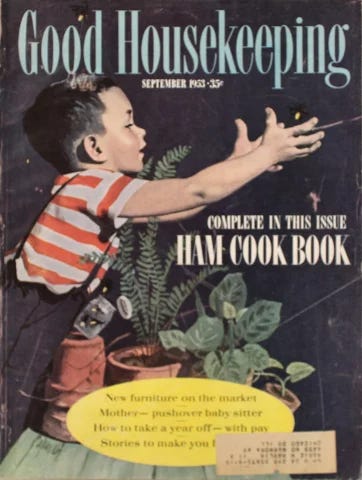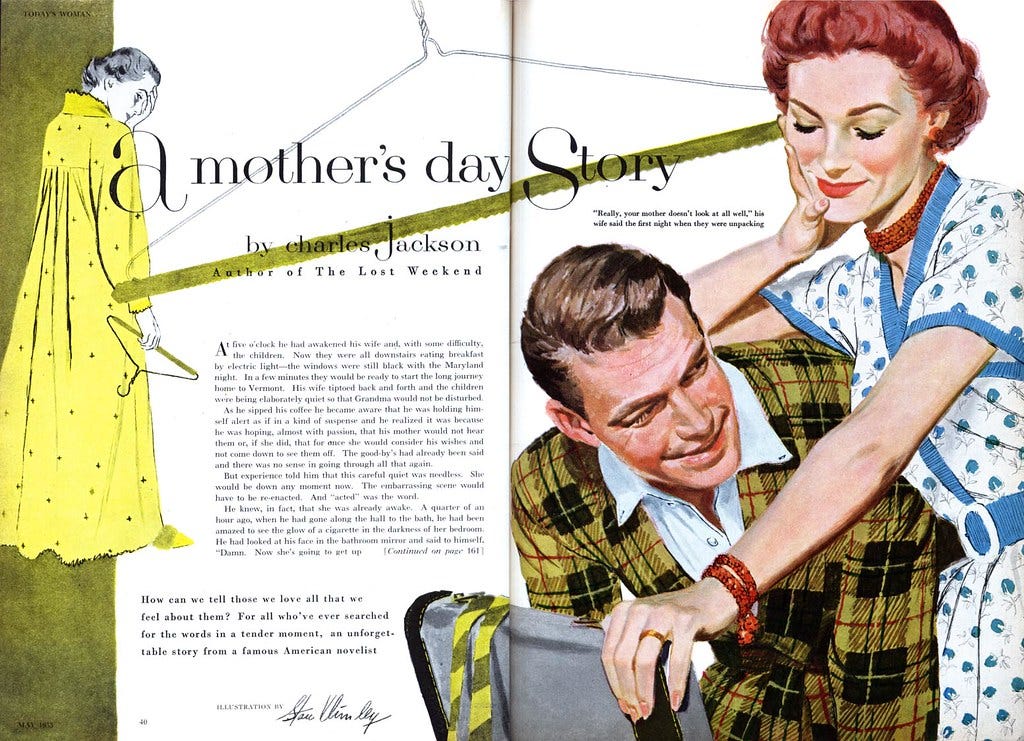“A man comes home and finds his best friend in bed with his wife. That man throws up his hands in disbelief and says, ‘Joe, I have to—but you?’ - attributed to Milton Berle, stolen from Philogelos
An interloper disturbs a marriage that has fallen into comfortable domesticity with declarations of undying love for the wife. The narrator worries, but ultimately the other man isn't a threat. By the end, the other man has been banished and everything returns to normal. Yet, the incident has revealed fault lines.
This story is all kinds of 50s sexism. The narrator describes Ethel, his wife by looks and her unpaid labor. He belittles her, calling her diploma a short-lived joke. Dr. Trencher, the obsessed interloper, claims that he's in love with Ethel. His obsession is more about his needs than anything. The narrator worries about Ethel falling for Dr. Trencher because she might pity him. He doesn't think that she's smart enough to resist. Ethel hasn't felt anything but numb acceptance for years. When she expresses her dissatisfaction, the narrator dismisses her.
The patriarchy thrives on unpaid labor. The narrator hasn't cared about Ethel's feelings for a long time. He's worried that if she leaves him, he'll lose his cook, maid and caregiver. He continues to denigrate her. Neither the narrator nor Dr. Trencher care about Ethel. They only see her as a prize. Once the narrator throws Dr. Trencher out of his apartment, the marriage supposedly returns to normal; the title suggests otherwise.
You can read this story through a feminist lens, but John Cheever may not have intended it to be a feminist story. Like the narrator, Cheever took his wife for granted. He had affairs with men and women. As much as this story may invoke Handmaid's Tales shivers with modern readers, 1950s readers thought this marriage ideal.
Beyond the feminist reading, this story also has a great deal of resonance. If you've lived long enough you can identify with at least one of the characters. Most likely you can relate to all three.
First, the narrator is awful, but he's also clinging to a dead relationship. He thinks he can control it, but ultimately he's been blindsided like so many before him. When someone cheats on you – even emotionally – it stings, especially if you don't see it coming. You might have even thought that you were at a good place.
Doesn't matter if you were unhappy. You had stability and now it's gone. You might have to date again. The relationship could end or go back to normal. Either way, your partner isn't satisfied. No matter what you do, you're no longer enough.
Then there's Ethel. She's accepted her life for years. Finally one thing enters her life and she knows that she's unhappy. Even from the narrator's perspective, we know that Ethel is doesn't fully reject Dr. Trencher. The narrator thinks that she pities him but she really likes the attention, attention that she hasn't been getting from her husband. She has been so unhappy that she didn't even realize she was unhappy until Dr. Trencher offered an alternative.
Finally she explodes with bathos: “I cry because my father died when I was twelve and because my mother married a man I detested or thought that I detested…I cry because of some unkindness that I can’t remember. I’m tired- because I’m tired and I can’t sleep.” If this isn't a breakthrough, it's certain the beginning of self-reflection.
Of course, the narrator backs off from the womanly emotions and hopes that she gets over it. Whether she continues to explore her unhappiness or represses it for the sake of the marriage, she knows that she's not happy.
“It takes a long time to realize how truly miserable you are, and even longer to see it doesn't have to be that way” - Cuddly Whiskers
Finally we have Dr. Trencher. If you had a happy childhood, complete with emotionally stable parents and a healthy support group, please tell me what that's like. It sounds wonderful. If not, you've probably been Dr. Trencher. Dr. Trencher is not only delusional about his feelings for Ethel; he's actively delusional. He's convinced himself that Ethel is his key to his happiness. He thinks that she can take away every disappointment, every loss, every moment of loneliness.
He's not in love with Ethel. He's in love with the idea of being in love. To wallow in unrequited love is selfish, but also intoxicating. Even better, it can remain as long as there's no chance of it turning real. You can spend many hours thinking that your life would be perfect if only they would call. For some, the pain of unrequited obsession feels better than a real relationship full of miscommunication, insecurity and disappointment. At least obsession is consistent.
I wish I could say that I don't speak from experience.
Either way, Ethel doesn't outright reject Dr. Trencher because she likes the attention. Her ambiguous response gives Dr. Trencher just enough fuel for optimism. So he keeps going until the narrators pushed him out.
These are broad characters and the story will hit you in the memories, but it won't last. All of these characters and situations have been depicted better. For examaple:
The narrator is Don Draper, taking poor Betty and then Megan for granted.
The manga Talk to my Back by Yamada Murasaki mirrors Ethel's experience.
Rebecca Bunch of Crazy Ex-Girlfriend explores the kind of love obsession displayed by Dr. Trencher, but happily she actually gets better over four seasons.
This is a slight story. John Cheever was still living in New York City. In the future, he'd explore unhappy marriages and obsession with much more nuance and exuberance.
Next Week: Poor Clarissa meets a Predator
Sorry. I’m still struggling with rent so if you could donate to my GoFundMe that would be great.
For more stories about bad marriages, may I suggest This Other Eden by Michael Hemmingson








Did people get this one? I mean in their email? Took me a long time to receive it